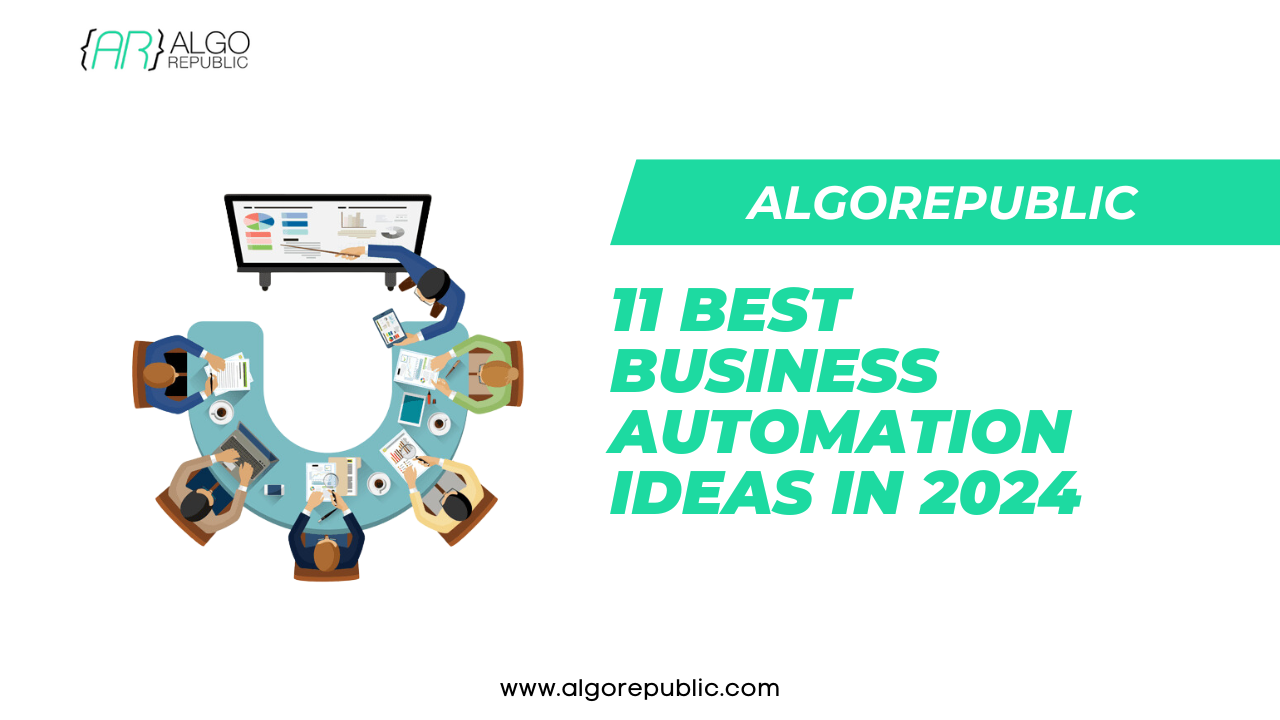Table of Contents
When you enter a fast paced business realm, staying competitive requires businesses to embrace technological advancements. One of the most effective ways to enhance productivity and efficiency is through business automation. Automation business ideas not only saves time but also reduces errors, increases scalability, and allows employees to focus on more value-added tasks.
What is Business Automation?
At its core, online business automation refers to the use of technology to perform tasks without human intervention. The primary goal of automation is to enhance efficiency, reduce errors, and optimize processes by giving repetitive and time-consuming tasks to machines or computer systems. When we have things to automate, it empowers individuals and organizations to focus on more complex and creative aspects of their work, leading to increased productivity and innovation.
Evolution of business Automation:
The concept of automating software has roots that go back through centuries, but its true emergence gained momentum during the Industrial Revolution. Early office automation software examples include the mechanization of tasks in textile mills and the invention of the steam engine. However, the term “automation” as we understand it today became prominent in the mid-20th century.
The 1950s saw the birth of business software automation, with the introduction of the first programmable logic controllers (PLCs). These devices allowed for the automation of industrial processes, particularly in manufacturing. Over the decades, the integration of computers, sensors, and advanced algorithms has propelled automation into new frontiers, extending its influence beyond the factory floor to offices, homes, and virtually every sector of society.
Also Read: Retail Supply Chain Challenges with AlgoRepublic
Business Automation Ideas
1. Customer Relationship Management (CRM) Automation:
Effective CRM automation goes beyond basic contact management. It is among the best ideas for automation (California). It involves using data insights to improve customer interactions and boost sales. Tools like Salesforce offer advanced features such as lead scoring, automated email campaigns, and personalized communication. Automation in CRM like ETE marketing allows businesses to track customer interactions, identify sales opportunities, and streamline the entire customer lifecycle.
Example:
Imagine a scenario where a potential customer visits an e-commerce website, browses products, and adds items to their cart but doesn’t make a purchase. With CRM company automation, the system can trigger an automated email with personalized product recommendations, enticing the customer to complete the purchase.
2. Email Marketing Automation:
Email marketing automation is not just about sending mass emails; it’s about delivering the right content to the right audience at the right time. Advanced email marketing platforms like Mailchimp provide features such as drip campaigns, behavior-triggered emails, and A/B testing. Automation allows businesses to nurture leads through targeted and personalized communication, improving open rates and conversion rates.
Example:
A subscription-based service can automate a series of onboarding emails to new users, guiding them through the platform’s features, offering tips, and gradually showcasing the value of the service. This not only enhances user experience but also increases user retention.
3. Financial Processes Automation:
Automated businesses (Texas) in financial processes extend beyond basic bookkeeping. Platforms like QuickBooks automate invoicing, expense tracking, and payroll, ensuring accurate and timely financial transactions. Integration with bank feeds automates the reconciliation process, providing real-time insights into cash flow and financial health.
Example:
Consider a scenario where a business receives a payment. Automation can update the accounting system, send a thank-you email to the customer, and trigger an inventory update if it’s a product sale—all without manual intervention.
4. Supply Chain Management Automation:
Automation in supply chain management is one of the best examples of automation in business and optimizes the entire process, from procurement to delivery. Tools like SAP and Oracle SCM or Fulfillment for WMS offer end-to-end automation, incorporating demand forecasting, inventory tracking, and order processing. This workflow in top automated businesses (New york) ensures efficient resource allocation, reduces lead times, and minimizes operational costs.
Example:
In the retail industry, supply chain automation can trigger automatic restocking when inventory levels reach a predefined threshold. This not only prevents stock outs but also ensures that capital is not tied up in excess inventory.
5. Human Resources (HR) Automation:
HR automation is among the best automated online business ideas and goes beyond applicant tracking. It encompasses onboarding, performance management, and employee engagement. Modern HR tools like BambooHR automate routine tasks, facilitate paperless onboarding, and provide a centralized platform for employee data management to bring recruitment business automation ideas to life.
Example:
An HR automation system can trigger a series of onboarding tasks for a new employee, including setting up email accounts, assigning training modules, and scheduling orientation sessions. This flow of HR automation projects ensures a smooth and consistent onboarding experience for every new hire.
6. Social Media Management Automation:
Managing multiple social media platforms requires consistent and timely content delivery. Social media automation tools like Hootsuite enable businesses to schedule posts, track engagement, and analyze performance metrics. Small business automation ensures a strategic and cohesive social media presence.
Example:
A business can use social media automation to schedule posts during peak engagement hours, ensuring that content reaches a broader audience. Additionally, automation can track social media mentions and trigger responses or alerts for timely engagement.
7. Data Entry and Record Keeping Automation:
Data entry is a time-consuming and error-prone task. Business automation software like Zapier and Integromat and record keeping tools like AYDF allow businesses to integrate applications and automate data entry processes. This not only ensures data accuracy but also facilitates seamless information flow across different departments.
Example:
Consider a scenario where customer data from an online form needs to be entered into a CRM system. Automation can automatically transfer the data, eliminating the need for manual entry and reducing the risk of errors. This is one of the most common examples of automation in the field of data entry and a crucial one as well.
8. IT Operations Automation:
IT operations automation focuses on enhancing system reliability and security. Tools like Ansible automate routine IT tasks, server provisioning, and configuration management to help create an environment of the best automated business. Automation in IT operations ensures proactive system maintenance, reducing downtime and improving overall network security.
Example:
Automation software companies can help create system monitoring that can detect potential issues before they escalate. For instance, if a server’s performance degrades, automation can trigger a series of actions, such as allocating additional resources or alerting the IT team for investigation. This is one of the most profitable automated businesses.
9. Document Management Automation:
Efficient document management involves more than just storing files. Automation tools like M-Files and SharePoint automate document creation, approval workflows, and version control. This ensures that documents are easily accessible, secure, and comply with regulatory requirements.
Example:
A document management system can automate the approval process for contracts. When a contract is uploaded, the system can route it to the relevant stakeholders for approval, track changes, and maintain a version history for auditing purposes. Imagine an employee sets up an automation that transfers it to relevant destinations on its own.
10. E-commerce Business Automation:
E-commerce automation is crucial for managing inventory, processing orders, and delivering a seamless shopping experience. Platforms like Shopify and Woo Commerce offer automation features that optimize product listings, manage inventory levels, and automate order fulfillment.
Example:
Automated order processing can trigger the generation of shipping labels, update inventory levels, and send order confirmation emails—all in real-time. This level of Business automation ensures efficient order fulfillment and enhances customer satisfaction.
11. Workflow Business Automation:
Workflow Business automation involves designing and automating custom workflows tailored to the specific needs of a business. Tools like Kissflow and Nintex provide a visual interface to create, modify, and optimize workflows. Automation enhances collaboration, reduces bottlenecks, and improves overall process efficiency.
Example:
An approval workflow can be automated to streamline the process of reviewing and approving project proposals. As each stage is completed, the system can automatically notify the next approver, ensuring a smooth and timely approval process.
Also Read: How Businesses Benefit from LLM?
Types of Business Automation:
Fixed or Hard Automation:
This form of automation is highly specialized and suited for mass production of a specific product. The equipment is set up to perform a fixed sequence of tasks without flexibility. While efficient for large-scale production, it lacks adaptability for diverse tasks.
Programmable Automation:
Programmable automation allows for reprogramming machines or systems to handle different tasks or product variations. This flexibility is valuable in environments where product lines may change, providing a middle ground between hard automation and manual labor.
Flexible or Soft Automation:
Soft automation employs advanced control systems and robotics to adapt quickly to changing tasks. This type of automation is prevalent in industries where customization and rapid changes in production are essential, offering versatility and efficiency.
Applications of Automation:
Industrial Automation:
In manufacturing, industrial automation plays a pivotal role in optimizing production processes. Automated assembly lines, robotic arms, and CNC machines are examples of technologies that have revolutionized manufacturing, leading to increased precision, speed, and cost-effectiveness.
Home Automation:
The rise of smart homes has brought automated business concepts into our daily lives. From thermostats that adjust based on our habits to voice-activated virtual assistants controlling household appliances, home automation enhances convenience, energy efficiency, and security.
Business Process Automation (BPA):
BPA involves using technology to automate complex business processes. This can include automation in project management and routine tasks in areas such as finance, human resources, and customer relationship management, leading to improved accuracy and efficiency. If you are thinking about automated businesses to invest in, this is the right time to make this move.
Information Technology (IT) Automation:
In the realm of IT, when you automate an industry it simplifies repetitive tasks such as software deployment, system configuration, and network management. Tools like Ansible and Puppet automate these processes, reducing manual effort and minimizing errors.
Transportation and Logistics Automation:
Business automation services have made significant changes in transportation and logistics, with technologies like autonomous vehicles and automated warehouse systems. These innovations enhance efficiency, reduce costs, and improve safety in the movement of goods and people. This is among the best automated systems examples in the current business realm.
Benefits of Business Automation:
Increased Efficiency:
Business automation software eliminates the time-consuming and repetitive nature of certain tasks, allowing processes to be completed faster and with greater precision. This leads to increased productivity and a more streamlined workflow.
Reduced Errors:
Human errors are an inevitable part of manual tasks. Such automation examples in business reduce the likelihood of errors, particularly in tasks that require high levels of accuracy. This is particularly critical in industries such as healthcare, where precision is paramount.
Cost Savings:
While the initial investment in automation technology can be significant, the long-term cost savings are often substantial. Automated processes can operate around the clock without the need for breaks, resulting in increased output and reduced labor costs. If you have a business idea looking to add examples of automation in it, make sure to choose the right automation software companies
Enhanced Safety:
Automation is instrumental in tasks that pose risks to human safety, such as handling hazardous materials or working in extreme environments. By delegating these tasks via automatization examples, the risk of accidents and injuries is significantly reduced.
Improved Quality:
Automated processes consistently produce high-quality outputs. Whether in manufacturing or data analysis, or simply with iphone automation ideas, Business automation ensures that tasks are performed to predefined standards, leading to improved overall quality.
Challenges and Considerations:
While such amazing examples of Business automation in the workplace brings numerous benefits, it is not without challenges. The potential for job displacement, ethical considerations, and the need for cybersecurity in automated systems are critical aspects that must be carefully navigated. Striking a balance between the advantages of Business automation and addressing its associated challenges is key to its responsible and sustainable implementation.
Future Trends:
The future of automation promises even more transformative innovations. IT automation examples like Artificial intelligence (AI), machine learning, and the Internet of Things (IoT) are converging to create intelligent, interconnected systems capable of autonomous decision-making. As such automation software examples continue to advance, the scope of automation is likely to expand into new realms, ranging from healthcare to environmental sustainability.
Looking for the best automated business examples or fully automated business ideas? AlgoRepublic is here to make your dream business a reality. Let’s get started today!



